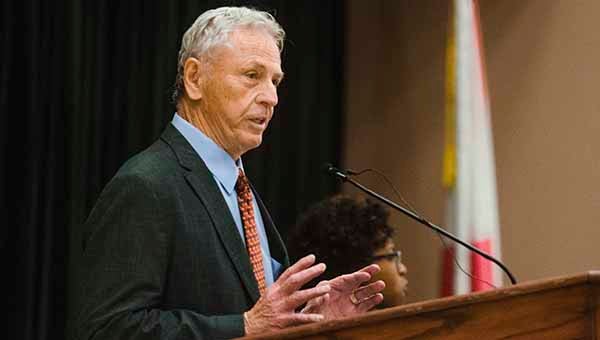Dees: ‘The march for justice continues’
Published 3:00 am Thursday, March 23, 2017

Morris Dees, co-founder and chief trial counselor of the Southern Poverty Law Center speaks at Troy University’s annual M. Stanton Evans Journalism Symposium Wednesday about “justice for all in a changing America.”
Morris Dees, co-founder and chief trial counsel of the Southern Poverty Law Center was the featured speaker at Troy University’s Annual Journalism Symposium at the Trojan Center Wednesday.
Dees received a standing ovation when he was introduced and another when he closed with a biblical quotation inscribed on the Civil Rights Memorial in Montgomery. The quotation from Amos 5:24 was paraphrased by Dr. Martin Luther King Jr. “…we will not be satisfied until justice rolls down like waters and righteousness like a mighty stream.”
Dees talked of his ties to the Pike County area that include being a descendant of the county’s first sheriff and kin to folks at Red’s Little Schoolhouse Restaurant. He spoke briefly of his representation of Gary Dickey, editor of the Troy State College student newspaper, The Tropolitan in 1967. Dickey had been expelled from the college in a dispute about an editorial and was seeking reinstatement. Citing constitutional issues of free expression, U.S. District Judge Frank M. Johnson ruled in Dickey’s favor.
Dees then directed his remarks to the topic of the 2017 Troy University Journalism Symposium, “With Justice for all in a Changing America.”
Dees was born in Shorter in 1936. His father was a cotton farmer and he worked in the fields with blacks. It was there in the cotton fields where Dees became a champion for the marginalized and the mistreated.
He remembered how, as a young schoolboy, he stood with his classmates and recited the Pledge of Allegiance: “One nation with liberty and justice for all.”
“That was in 1948,” he said. “That was before ‘under God’ was included. ‘One nation with liberty and justice for all.’ America was set up for the benefit of all of us.”
However, Dees said America continues to be for many “a lonely island of poverty in the vast ocean of material prosperity.”
“The march for justice continues,” he said. “LGBT rights is big. That has not been decided yet. Mass incarceration and healthcare continue to be big. Immigration is very big.”
Immigration has and will continue to play a huge role in changing America, Dees said.
In the 1980s the non-white population in the United States was 15 percent. Today, people of color make up 37 percent of the nation’s population.
“By 2040, people of color will politically control the country,” he said.
Dees cited the Vietnamese as rather recent immigrants who came to America and have made significant contributions.
After the United States “lost its first war” in Vietnam, a half million Vietnamese immigrants came to an “angry, angry country. Fifty-thousand Vietnamese came to the Houston, Texas area,” he said. “They were hard working people and they began working in the shrimping business.”
Dees said the Vietnamese bought broken boats and fixed them up and put them in the water. They worked hard at their business and were profitable; so profitable, in fact, that the American fishermen became jealous.
When the attempts by the American fishermen to pressure the Texas State Legislature into making it illegal for the immigrants to shrimp, the KKK used terror tactics to try and run the Vietnamese out of business.
The Southern Poverty Law Center was successful in protecting and preserving the rights of the Vietnamese fishermen and securing for them “a place at America’s table.”
Today, Dees said the Southern Poverty Law Center continues to take a stand on issues that make a difference in the ever-changing demographics of America.
And with change comes discord and a myriad of problems that can be solved only through reconciliation and forgiveness.
Dees told the story of a black woman, Beulah Mae Donald of Mobile, whose son Michael was strangled and fatally beaten in Baldwin County. His body was found hanging from a tree in Mobile. Two Ku Klux Klansmen were convicted in the case.
Dees was the chief attorney in a wrongful death suit filed against the KKK by the Donald family. In February 1987, a jury awarded the family a $7 million judgment against the Klan.
One of the Klansmen was sentenced to die in Alabama’s electric chair for Michael Donald’s murder. The other, who was sentenced to life in prison, asked to speak to Beulah Mae Donald.
“He looked at her when he spoke,” Dees said. “‘Mrs. Donald, can you forgive me?’ the former Klansman asked in a choking voice. She leaned back, looked directly at him and said, ‘I already have.’ She was full of reconciliation and forgiveness.
“That is the solution.”
XX




